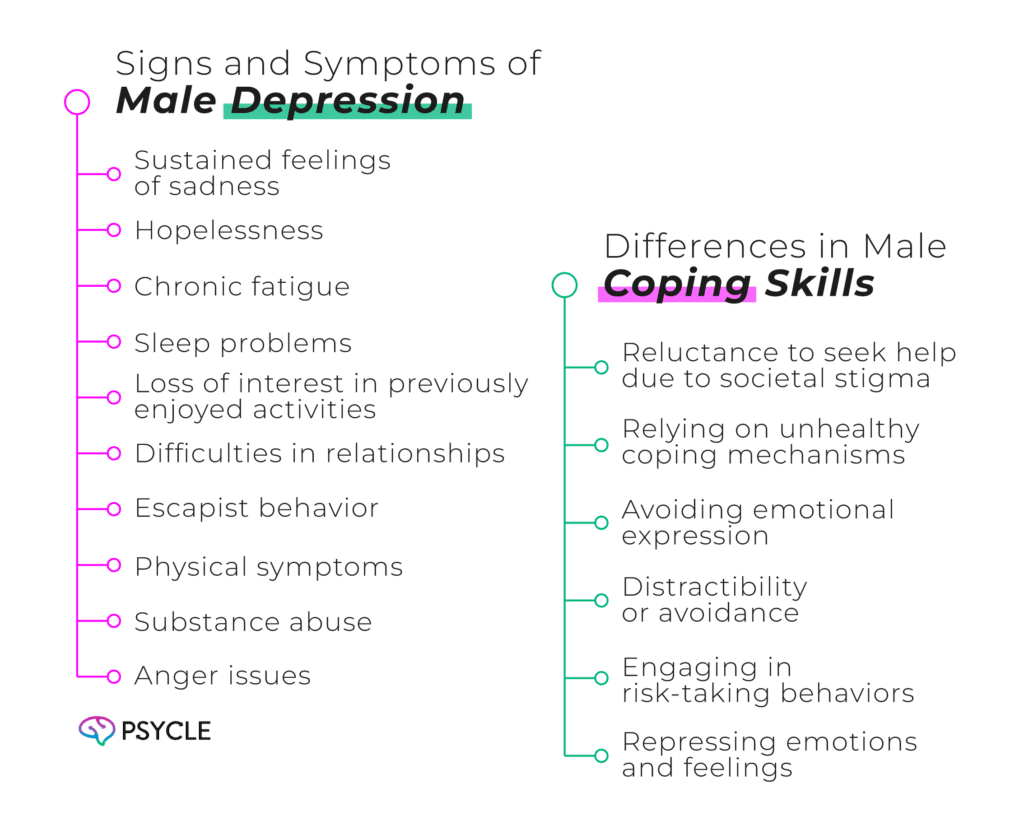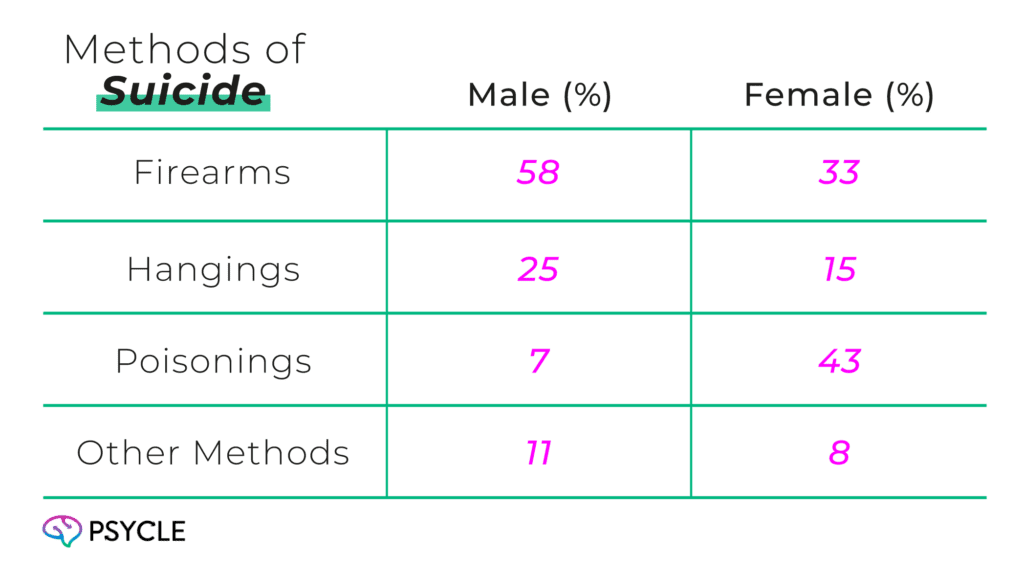Supporting a man with depression is crucial for his well-being. Many men try to ignore or refuse treatment for depression, often hiding behind unhealthy coping behaviors. It is important to create a safe space for a man to express his feelings and offer practical support, such as helping with tasks or accompanying him to appointments.
Being patient and understanding, educating yourself about depression, and encouraging professional help are all important strategies for helping a man with depression.
Key Takeaways
- Creating a safe space for a man to express his feelings is crucial.
- Offering practical support, such as helping with tasks and appointments, can make a difference.
- Being patient and understanding is important for helping a man with depression.
- Educating yourself about depression will enable you to offer informed support.
- Encouraging professional help is important for his recovery.
Understanding Male Depression
Depression can have different impacts on men compared to women, with varying signs, symptoms, and coping mechanisms. These differences can be attributed to factors such as brain chemistry, hormones, life experiences, and societal expectations related to the male role.
Men experiencing depression may feel persistent sadness, hopelessness, and fatigue. They may also encounter sleep disturbances and lose interest in activities they once enjoyed. Additionally, they may face difficulties in relationships, engage in escapist behavior, exhibit physical symptoms, abuse substances, and struggle with anger issues.
It’s crucial to recognize that these behaviors could be indicative of depression or other mental health concerns. Seeking professional help is essential for accurate diagnosis and appropriate treatment.
The Role of Brain Chemistry and Hormones
Research suggests that differences in brain chemistry and hormone levels between men and women may contribute to variations in how depression presents itself. Hormonal fluctuations, such as changes in testosterone levels, can influence mood and overall mental well-being.
Understanding these biological factors can help healthcare professionals tailor treatment approaches to address male depression effectively.
Societal Expectations and the Male Role
Societal expectations surrounding masculinity and the traditional male role can also impact the manifestation of depression in men. Societal pressures to be strong, self-reliant, and stoic often discourage emotional expression.
Consequently, men may find it challenging to seek help or discuss their feelings openly, hindering their ability to address their mental health concerns.
Recognizing these unique factors and societal influences is important for providing appropriate support and promoting mental well-being among men.


Barriers to Diagnosis and Treatment for Men with Depression
Men with depression face various barriers when it comes to receiving an accurate diagnosis and effective treatment, including failure to recognize symptoms, downplaying symptoms, societal stigma, and fear of seeking help.
Failure to Recognize Symptoms
Depression in men can manifest differently than in women, which can lead to challenges in recognizing the symptoms. Men may exhibit symptoms that are not typically associated with depression, such as physical complaints or escapist behavior. This can result in their depression being overlooked or misdiagnosed as a different condition.
Downplaying Symptoms
Due to societal expectations and traditional masculine norms, men may downplay their symptoms and avoid seeking help. There is a common fear among men that asking for help or showing vulnerability is a sign of weakness. This reluctance to acknowledge and address their symptoms can hinder the diagnosis and treatment of their depression.
Societal Stigma
Society places significant stigma on mental health issues, including depression. Men may fear being judged or ridiculed if they admit to having depression. The fear of being perceived as weak or inadequate can prevent men from seeking the support and treatment they need for their mental well-being.
Fear of Seeking Help
Men often face a fear of seeking professional help due to various reasons. They may worry about being stigmatized, misunderstood, or judged by others. Seeking help for mental health issues can be seen as a sign of weakness and can clash with societal expectations of masculinity. This fear can be a significant barrier to men accessing the necessary treatment and support for their depression.
Addressing these barriers requires creating a supportive and non-judgmental environment in which men feel comfortable expressing their emotions and seeking help. It is essential to promote awareness and understanding of male depression and to challenge societal stigmas surrounding mental health. By doing so, we can improve the diagnosis and treatment of depression in men and provide them with the support they need to recover
The Impact of Male Depression on Suicide Rates
Although women attempt suicide more often than men, men are more likely to die by suicide. Men with depression face an increased risk of suicidal thoughts and behaviors, making it crucial to understand the impact of male depression on suicide rates.
One contributing factor is the methods used in suicide attempts. Men are more likely to choose highly lethal methods, such as firearms, which increases the likelihood of fatal outcomes.
Another factor is impulsive actions. Men with depression may be more prone to impulsive behaviors, which can escalate into suicide attempts without warning.
Furthermore, men with depression may exhibit fewer warning signs compared to women. Society often expects men to be strong and not show vulnerability, making it harder to recognize their distress and take appropriate action.
Substance abuse also increases the risk for suicide among men with depression. Many men may turn to alcohol or drugs to cope with their emotional pain, which can worsen their symptoms and impair judgment. Substance abuse further heightens the risk of suicidal ideation and behavior.
It is crucial to emphasize the importance of seeking help for men with depression. Timely intervention and appropriate support can save lives. Seeking help from suicide hotlines or crisis centers is crucial in immediate crisis situations. Loved ones and professionals should also be involved in providing support and ensuring that individuals do not have access to means of self-harm.
Warning Signs of Male Depression and Suicide
Recognizing the warning signs is crucial for identifying when a man with depression may be at an increased risk of suicide. Some common warning signs include:
- Expressing feelings of hopelessness or worthlessness
- Withdrawing from friends and family
- Engaging in reckless or risky behaviors
- Increased alcohol or drug use
- Talking about death or suicide
- Giving away possessions
- Expressing a sense of being trapped or having no way out
It is important to take any signs of distress seriously and encourage the individual to seek professional help.


The table above illustrates the different methods used by men and women in suicide attempts. It highlights the higher incidence of firearm use among men, which significantly contributes to the gender disparity in suicide rates.
It is crucial to promote awareness and understanding of male depression and its impact on suicide rates. By addressing the unique challenges faced by men and supporting them to seek help, we can work towards reducing the number of male suicides and improving mental health outcomes.
The Importance of Creating a Supportive Environment
Creating a supportive environment is crucial when helping a man with depression. By encouraging open communication and providing a safe space for him to express his feelings, you can make a significant difference in his well-being.
It’s important to validate his emotions and experiences, showing him that his feelings are valid and that he is not alone in his struggles. Patience and understanding are key in this process, allowing him to process his emotions at his own pace.
Active listening and empathy are essential elements of creating a supportive environment. By actively listening to him, you show that you genuinely care and are interested in understanding his perspective. Validating his feelings and experiences helps him feel heard and acknowledged.
Remember to be patient as he navigates his journey, as recovery from depression takes time and varies for each individual. Understanding that healing is a process and not an overnight solution is crucial for providing ongoing support.
The stigma surrounding mental health can make it difficult for men to seek help. Creating a supportive environment without judgment or stigma is essential for encouraging men to open up and seek the assistance they need.
By normalizing conversations about mental health and emphasizing that seeking help is a sign of strength, you can break down the barriers preventing men from reaching out.
Remember, creating a supportive environment is an ongoing effort. Consistently practicing open communication, validation, patience, and understanding will foster a safe and nurturing space for a man with depression to navigate his journey toward healing.
Offering Practical Support
Practical support can make a significant difference in helping a man with depression navigate his journey towards recovery. By offering assistance with various tasks and responsibilities, you can provide a helping hand during challenging times.
One way to offer practical support is by assisting with daily tasks such as household chores, errands, or other responsibilities. By helping to lighten his load, you can alleviate some of the burdens he may be experiencing and allow him to focus more on his well-being.
Accompanying him to therapy or doctor’s appointments can also be a valuable form of support. By offering to join him on these visits, you provide not only physical assistance but also emotional support and encouragement. This can help him feel more comfortable and motivated to seek professional help when needed.
By offering practical support and helping with daily responsibilities, you can make a positive impact in the life of a man with depression. Your assistance can provide the space and support he needs to focus on his recovery and overall well-being.
Educating Yourself about Depression
Educating yourself about depression is essential for effectively supporting a man with depression. By learning about the symptoms, causes, and treatment options, you can better understand his experiences and offer informed support.
Learning about Symptoms
Depression can manifest in various ways, and understanding the common symptoms can help you recognize when a man is struggling. Symptoms may include persistent sadness, loss of interest in activities, changes in appetite or sleep patterns, difficulty concentrating, and feelings of worthlessness or guilt.
Exploring Treatment Options
Learning about different treatment options is crucial. Medication, therapy, or a combination of both may be recommended, depending on the severity of the depression.
Resources for Education
There are many resources available to deepen your understanding of depression. Books, articles, and websites provide valuable information on symptoms, causes, and evidence-based treatments. Additionally, reputable mental health organizations and support groups offer educational materials and online courses to further your knowledge.
Encouraging Professional Help
Encouraging a man with depression to seek professional help is important for his recovery. Therapy, such as cognitive-behavioral therapy or talk therapy, can help him explore and address the underlying causes of his depression.
Medication may also be prescribed in some cases to help manage symptoms. It is important to support him in seeking professional treatment, whether it be therapy, medication, or a combination of both, so a qualified mental health professional can provide the necessary guidance and support.
Addressing the Unique Challenges of Male Depression
Male depression poses distinct challenges that call for a gender-sensitive approach to tackle the condition effectively. Understanding the symptoms commonly experienced by men, including aggression, irritability, and substance abuse, is pivotal in recognizing and addressing depression in this population.
It is also essential to acknowledge and combat the stigma and societal pressures that hinder men from seeking help. By creating an environment that acknowledges and respects the unique experiences of men with depression, we can foster a more inclusive and impactful approach to supporting their mental health.
The Role of Family Support
Family support plays a vital role in helping a man with depression. Open and honest communication within the family is crucial for understanding his experiences and providing the necessary support.
Family members can validate his feelings, offer empathy, and encourage him to seek professional help. By working together as a supportive unit, the family can contribute to his recovery and well-being.
Coping Strategies and Self-Care
Managing depression requires coping strategies and self-care practices that promote overall well-being. Encouraging a man to develop healthy ways of coping with his emotions can significantly impact his mental health. Here are some effective strategies to help men with depression:
Engage in Physical Activity
Regular physical activity has been shown to reduce symptoms of depression. Encourage the man to incorporate exercise into his daily routine, whether it’s going for a jog, practicing yoga, or joining a sports club. Physical activity releases endorphins, which elevate mood and improve overall mental health.
Practice Mindfulness or Meditation
Teach the man techniques for practicing mindfulness or meditation, which can help him manage stress and reduce symptoms of depression. Encourage him to set aside time each day for mindfulness exercises, such as deep breathing or focusing on the present moment. These practices can promote relaxation and emotional well-being.
Seek Social Support
Human connection is essential for mental health. Encourage the man to reach out to friends, family members, or support groups. Sharing thoughts and feelings with trusted individuals can provide emotional support and help combat feelings of isolation and loneliness.
Maintain a Balanced Diet
A healthy diet plays a crucial role in managing depression. Encourage the man to consume a balanced diet rich in fruits, vegetables, whole grains, and lean proteins. A diet that includes essential nutrients can improve overall well-being and support mental health.
Avoid Substance Abuse
Substance abuse can worsen symptoms of depression and hinder recovery. Encourage the man to avoid alcohol, illicit drugs, and excessive caffeine consumption. Substance abuse can interfere with mood regulation and exacerbate depressive symptoms. Encourage healthier coping strategies instead.
By prioritizing self-care and adopting healthy lifestyle choices, men with depression can take active steps towards managing their condition. These strategies can enhance overall well-being, promote emotional resilience, and empower individuals to overcome the challenges of depression.
Conclusion
Supporting a man with depression requires a compassionate and understanding approach. By creating a supportive environment, offering practical assistance, educating yourself, and encouraging professional help, you can make a positive impact on his well-being.
Remember to involve the support of family and loved ones, promoting open communication, empathy, and understanding. By working together, we can help men with depression navigate their journey towards recovery and promote better mental health for all.
FAQs
How Can I Create a Supportive Environment for a Man with Depression?
Creating a supportive environment involves encouraging open communication, providing a safe space for him to express his feelings, actively listening, and offering empathy. Validating his emotions and experiences while being patient and understanding can make a significant difference in his well-being.
Why are Suicide Rates Higher Among Men with Depression than Women with Depression?
Although women attempt suicide more often than men, men are more likely to die by suicide. This is due to several factors, including the methods used, impulsive actions, fewer warning signs, and a higher likelihood of engaging in substance abuse.
Why are Men Often Not Diagnosed or Treated for Depression?
There are several reasons why men with depression are often not diagnosed or treated. One barrier is the failure to recognize depression in men, as they may exhibit symptoms that are not typically associated with depression. Societal stigma and the fear of being perceived as weak also contribute to men downplaying their symptoms and being resistant to seeking help.
How Can I Help a Man with Depression?
Helping a man with depression requires a compassionate approach. By creating a supportive environment, offering practical assistance, educating yourself, and encouraging professional help, you can make a positive impact on his well-being. It is important to address the unique challenges faced by men with depression and involve the support of family and loved ones.
How Does Male Depression Differ from Female Depression?
Depression can affect men differently than women, often manifesting in different signs and symptoms. Men may use different coping skills, both healthy and unhealthy, than women. The reasons for these differences could be attributed to brain chemistry, hormones, life experiences, and societal expectations related to the male role.

